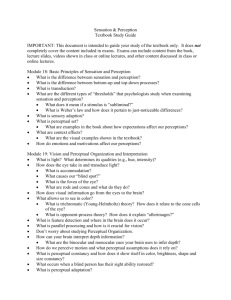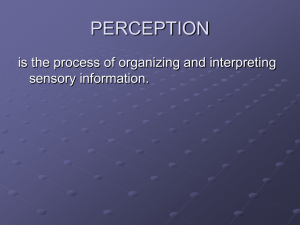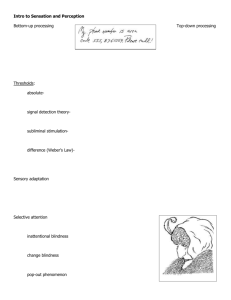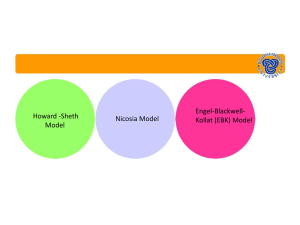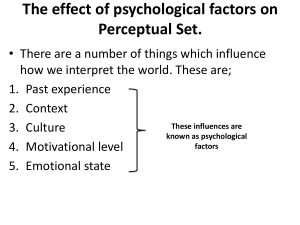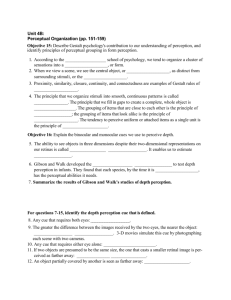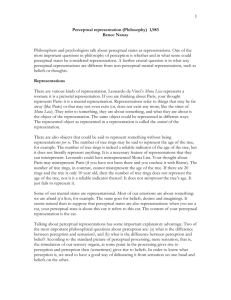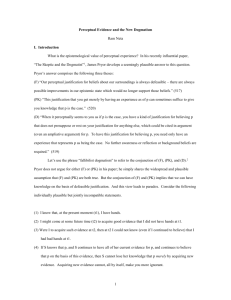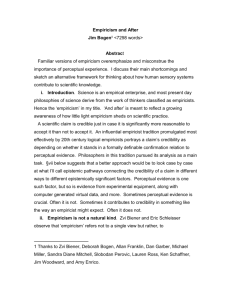Summer seminar 2013 - University of Reading Weblogs
advertisement
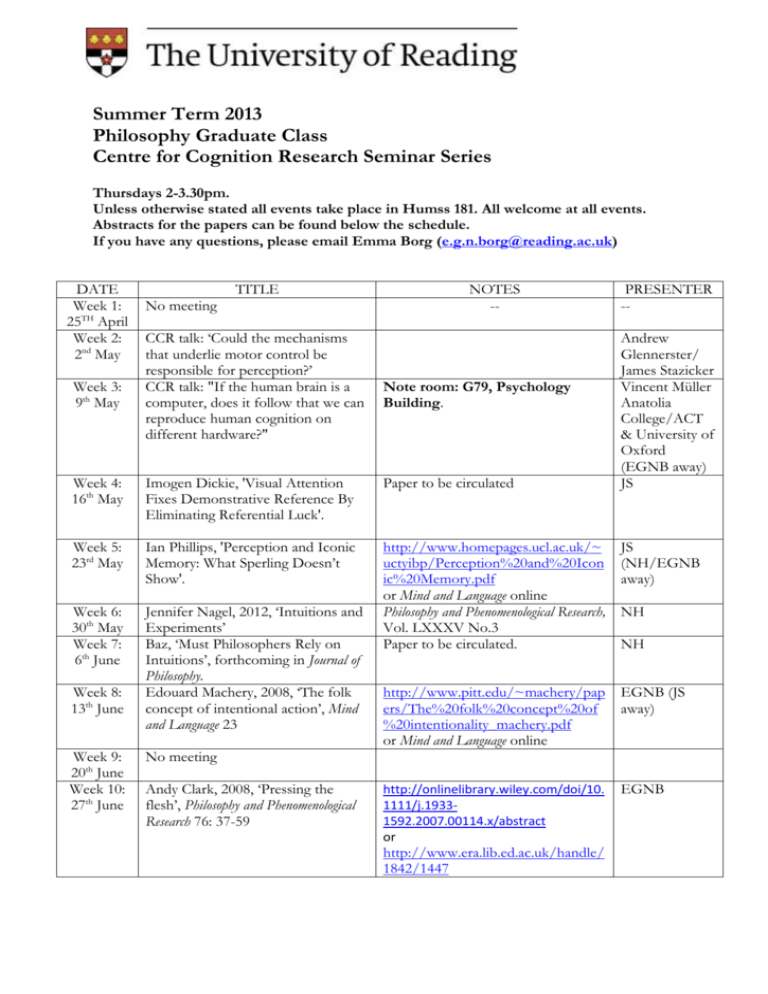
Summer Term 2013 Philosophy Graduate Class Centre for Cognition Research Seminar Series Thursdays 2-3.30pm. Unless otherwise stated all events take place in Humss 181. All welcome at all events. Abstracts for the papers can be found below the schedule. If you have any questions, please email Emma Borg (e.g.n.borg@reading.ac.uk) DATE Week 1: 25TH April Week 2: 2nd May Week 3: 9th May TITLE No meeting CCR talk: ‘Could the mechanisms that underlie motor control be responsible for perception?’ CCR talk: "If the human brain is a computer, does it follow that we can reproduce human cognition on different hardware?" NOTES -- Note room: G79, Psychology Building. PRESENTER -Andrew Glennerster/ James Stazicker Vincent Müller Anatolia College/ACT & University of Oxford (EGNB away) JS Week 4: 16th May Imogen Dickie, 'Visual Attention Fixes Demonstrative Reference By Eliminating Referential Luck'. Paper to be circulated Week 5: 23rd May Ian Phillips, 'Perception and Iconic Memory: What Sperling Doesn’t Show'. JS (NH/EGNB away) Week 6: 30th May Week 7: 6th June Jennifer Nagel, 2012, ‘Intuitions and Experiments’ Baz, ‘Must Philosophers Rely on Intuitions’, forthcoming in Journal of Philosophy. Edouard Machery, 2008, ‘The folk concept of intentional action’, Mind and Language 23 http://www.homepages.ucl.ac.uk/~ uctyibp/Perception%20and%20Icon ic%20Memory.pdf or Mind and Language online Philosophy and Phenomenological Research, Vol. LXXXV No.3 Paper to be circulated. http://www.pitt.edu/~machery/pap ers/The%20folk%20concept%20of %20intentionality_machery.pdf or Mind and Language online EGNB (JS away) http://onlinelibrary.wiley.com/doi/10. 1111/j.19331592.2007.00114.x/abstract or EGNB Week 8: 13th June Week 9: 20th June Week 10: 27th June NH NH No meeting Andy Clark, 2008, ‘Pressing the flesh’, Philosophy and Phenomenological Research 76: 37-59 http://www.era.lib.ed.ac.uk/handle/ 1842/1447 ABSTRACTS: 1) Glennerster We will discuss the question of whether mechanisms that underlie motor control could be responsible for perception by reference to findings from the Immersive Virtual Reality Lab, and by reference to some classic philosophical problems. Marr (1969) and Albus (1971) described how the wiring of the cerebellum provides a suitable mechanism for storing learned sequences of movements. It can be argued that a similar store would be suitable for representing the 3D shape and location of objects, since both can be described in terms of the sensory consequences of observer movements. This is distinguishable from the hypothesis that the brain generates something like a 3D reconstruction of the scene in object- or world-based coordinates. We'll discuss the extent to which storage and retrieval of this kind could explain perception of a scene, by reference to experimental data and by reference to the successes and failures of related philosophical theories, such as phenomenalism and 'bodily' theories of perception. 2) Müller Abstract to follow. 3) Dickie: “Suppose you are looking at an ordinary material thing in front of you. You think thoughts you would express by saying ‘That’s orange. It’s spherical. It’s moving to the left.’ In this case you are thinking what I shall call ‘perceptual demonstrative thoughts’: thoughts of the kind ordinarily made available by current perceptual contact with the objects they are about. This paper is about how perceptual contact with objects enables us to have perceptual demonstrative thoughts about them. The paper has four parts. §1 motivates two constraints on right accounts of perceptual demonstrative thought. §2 summarises some empirical results about perceptual attention. §3 uses these results to develop an account of perceptual demonstrative thought that meets the constraints. §4 gives two reasons to prefer the resulting account to its nearest rivals.” 4) Phillips: “Philosophers have lately seized upon Sperling’s partial report technique and subsequent work on iconic memory in support of controversial claims about perceptual experience, in particular that phenomenology overflows cognitive access. Drawing on mounting evidence concerning postdictive perception, I offer an interpretation of Sperling’s data in terms of cue-sensitive experience which fails to support any such claims. Arguments for overflow based on changedetection paradigms (e.g., Landman et al., 2003; Sligte et al., 2008) cannot be blocked in this way. However, such paradigms are fundamentally different from Sperling’s and, for rather different reasons, equally fail to establish controversial claims about perceptual experience.” 5) Nagel: "I agree with the experimentalists that the question of the epistemic status of epistemic intuitions is an excellent question, and that we can take some steps towards answering it by taking a close look at the empirical facts about intuition. I also agree that philosophers risk mistaking consensus for correctness when weighing the evidential value of their intuitions. In fact, according to the best available model of the relationship between subjective confidence and accuracy of intuition, the strength of an intuition generally correlates with its consensuality rather than its correctness. However, this model applies equally to domains whose epistemic legitimacy the experimentalists would not want to dispute; in particular, it applies to perceptual judgments. Rather than undermining the case method in epistemology, close attention to the mechanics of intuitive judgment reveals some deep similarities between epistemic intuition and perception". 6) Baz This is a neo-ordinary language attack on the way mainstream epistemologists (Williamson, DeRose, etc) use thought experiments to investigate the meaning of "knows" and other philosophically interesting expressions. 7) Machery “Recent experimental findings by Knobe and others ( Knobe, 2003; Nadelhoffer, 2006b; Nichols and Ulatowski, 2007 ) have been at the center of a controversy about the nature of the folk concept of intentional action. I argue that the significance of these findings has been overstated. My discussion is two-pronged. First, I contend that barring a consensual theory of conceptual competence, the significance of these experimental findings for the nature of the concept of intentional action cannot be determined. Unfortunately, the lack of progress in the philosophy of concepts casts doubt on whether such a consensual theory will be found. Second, I propose a new, deflationary interpretation of these experimental findings, ‘ the trade-off hypothesis ’ , and I present several new experimental findings that support this interpretation.” 8) Clark “Mind, it is increasingly fashionable to assert, is an intrinsically embodied and environmentally embedded phenomenon. But there is a potential tension between two strands of thought prominent in this recent literature. One of those strands depicts the body as special, and the fine details of a creature’s embodiment as a major constraint on the nature of its mind: a kind of newwave body-centrism. The other depicts the body as just one element in a kind of equal-partners dance between brain, body and world, with the nature of the mind fixed by the overall balance thus achieved: a kind of extended functionalism (now with an even broader canvas for multiple realizability than ever before). The present paper displays the tension, scouts the space of possible responses, and ends by attempting to specify what the body actually needs to be, given its complex role in these recent debates.”


